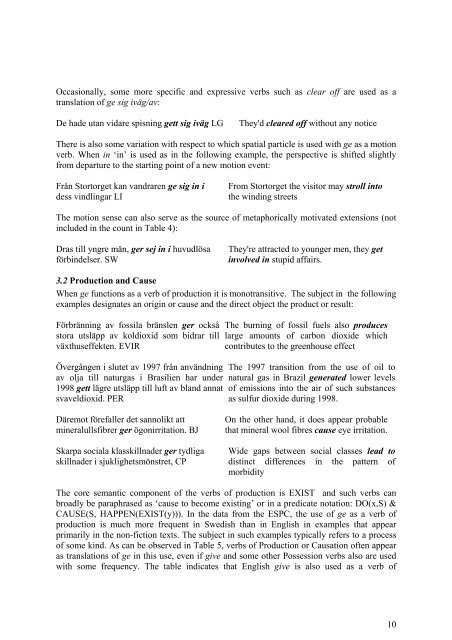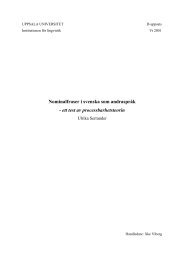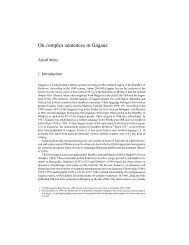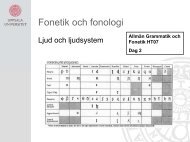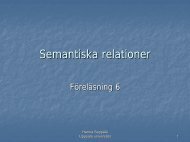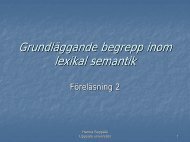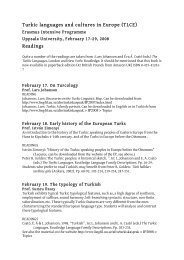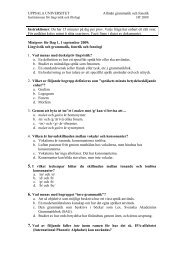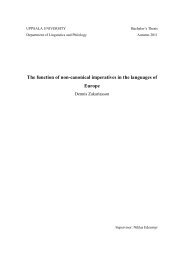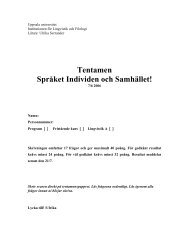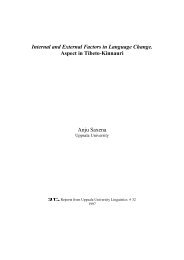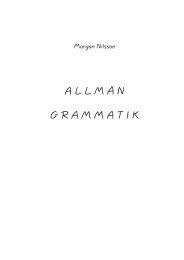The polysemy of Swedish ge 'give'
The polysemy of Swedish ge 'give'
The polysemy of Swedish ge 'give'
You also want an ePaper? Increase the reach of your titles
YUMPU automatically turns print PDFs into web optimized ePapers that Google loves.
Occasionally, some more specific and expressive verbs such as clear <strong>of</strong>f are used as a<br />
translation <strong>of</strong> <strong>ge</strong> sig iväg/av:<br />
De hade utan vidare spisning <strong>ge</strong>tt sig iväg LG<br />
<strong>The</strong>y'd cleared <strong>of</strong>f without any notice<br />
<strong>The</strong>re is also some variation with respect to which spatial particle is used with <strong>ge</strong> as a motion<br />
verb. When in ‘in’ is used as in the following example, the perspective is shifted slightly<br />
from departure to the starting point <strong>of</strong> a new motion event:<br />
Från Stortor<strong>ge</strong>t kan vandraren <strong>ge</strong> sig in i<br />
dess vindlingar LI<br />
From Stortor<strong>ge</strong>t the visitor may stroll into<br />
the winding streets<br />
<strong>The</strong> motion sense can also serve as the source <strong>of</strong> metaphorically motivated extensions (not<br />
included in the count in Table 4):<br />
Dras till yngre män, <strong>ge</strong>r sej in i huvudlösa<br />
förbindelser. SW<br />
<strong>The</strong>y're attracted to youn<strong>ge</strong>r men, they <strong>ge</strong>t<br />
involved in stupid affairs.<br />
3.2 Production and Cause<br />
When <strong>ge</strong> functions as a verb <strong>of</strong> production it is monotransitive. <strong>The</strong> subject in the following<br />
examples designates an origin or cause and the direct object the product or result:<br />
Förbränning av fossila bränslen <strong>ge</strong>r också<br />
stora utsläpp av koldioxid som bidrar till<br />
växthuseffekten. EVIR<br />
Övergån<strong>ge</strong>n i slutet av 1997 från användning<br />
av olja till naturgas i Brasilien har under<br />
1998 <strong>ge</strong>tt lägre utsläpp till luft av bland annat<br />
svaveldioxid. PER<br />
<strong>The</strong> burning <strong>of</strong> fossil fuels also produces<br />
lar<strong>ge</strong> amounts <strong>of</strong> carbon dioxide which<br />
contributes to the greenhouse effect<br />
<strong>The</strong> 1997 transition from the use <strong>of</strong> oil to<br />
natural gas in Brazil <strong>ge</strong>nerated lower levels<br />
<strong>of</strong> emissions into the air <strong>of</strong> such substances<br />
as sulfur dioxide during 1998.<br />
Däremot förefaller det sannolikt att<br />
mineralullsfibrer <strong>ge</strong>r ögonirritation. BJ<br />
Skarpa sociala klasskillnader <strong>ge</strong>r tydliga<br />
skillnader i sjuklighetsmönstret, CP<br />
On the other hand, it does appear probable<br />
that mineral wool fibres cause eye irritation.<br />
Wide gaps between social classes lead to<br />
distinct differences in the pattern <strong>of</strong><br />
morbidity<br />
<strong>The</strong> core semantic component <strong>of</strong> the verbs <strong>of</strong> production is EXIST and such verbs can<br />
broadly be paraphrased as ‘cause to become existing’ or in a predicate notation: DO(x,S) &<br />
CAUSE(S, HAPPEN(EXIST(y))). In the data from the ESPC, the use <strong>of</strong> <strong>ge</strong> as a verb <strong>of</strong><br />
production is much more frequent in <strong>Swedish</strong> than in English in examples that appear<br />
primarily in the non-fiction texts. <strong>The</strong> subject in such examples typically refers to a process<br />
<strong>of</strong> some kind. As can be observed in Table 5, verbs <strong>of</strong> Production or Causation <strong>of</strong>ten appear<br />
as translations <strong>of</strong> <strong>ge</strong> in this use, even if give and some other Possession verbs also are used<br />
with some frequency. <strong>The</strong> table indicates that English give is also used as a verb <strong>of</strong><br />
10


